NT healthcare must improve ahead of voluntary assisted dying laws, advocates say
The Chief Minister has slammed ‘scare campaign’ after lobbyists raise questions about vulnerable Territorians turning to euthanasia in the absence of good healthcare.
Politics
Don't miss out on the headlines from Politics. Followed categories will be added to My News.
Chief Minister Eva Lawler has criticised voluntary assisted dying “scare campaigns” after advocates raised concerns about how introducing legislation in the Northern Territory could impact Indigenous and other vulnerable patients.
The Territory’s current public consultation on VAD made front page news of the national broadsheet on Wednesday, highlighting survey questions that ask residents if they would support access to euthanasia being extended to children, people with dementia, or “if they only have a mental health condition as the reason for their access”.
Palliative care clinician and administrator of Health Professionals Say No Maria Cigolini told The Australian the questions were “biased and insensitive” to many issues facing Indigenous Territorians, “offering them death instead of the support that they need”.
She argued it was problematic to introduce VAD laws in the Territory because of significant health and social issues First Nations people face, often coupled with poor access to health services and palliative care.
“What we really need is not another way for these people to die, what we need is upstream strategies to promote resilience and healing and access to healthcare and social services,” Associate Professor Cigolini said.

Ms Lawler said the point of the public VAD consultation, which will inform an expert advisory panel report due in July, was to ensure that if legislation was brought in it “would be absolutely watertight”.
“I do not want scare campaigns being launched by media people in the Northern Territory in relation to voluntary assisted dying,” she said.
“We have voluntary assisted dying across Australia, we’ve seen it worldwide.
“We need to make sure that we have continued consultation and we’ll do that in a comprehensive and thorough way.
“Voluntary assisted dying is a sensitive topic in the Northern Territory, it’s a sensitive topic everywhere … we need to work very carefully with the Indigenous population and not have mistruths and poor information going out into the community.”

Palliative Care Australia does not oppose voluntary assisted dying, but said more investment was needed in healthcare to allow patients to make truly voluntary decisions at the end of life.
“Everyone needs to have the option of considering whether they have palliative care and do VAD, or one or the other,” chief executive Camilla Rowland said.
“We know that palliative care is a postcode lottery across Australia and we don’t want people to be influenced to say, ‘look, I just can’t get palliative care in my remote area, therefore, I will choose voluntary assisted dying’.”
Ms Rowland said it was too early for data from other states to show the rate of Indigenous people accessing euthanasia schemes.

Sue Shearer is a member of the VAD expert panel, and chief executive of Council on the Ageing NT, a group that has long advocated for legislation to be reintroduced in the Territory.
She said palliative care in Darwin and Alice Springs was “fantastic”, but VAD was about giving people options.
“There are concerns that legislation would be misconstrued and people with religious belief will try to – like they did in ‘95 – frighten Indigenous people,” Ms Shearer said.
“But it can be pretty simple, it’s a voluntary scheme, nobody will be forced.”





